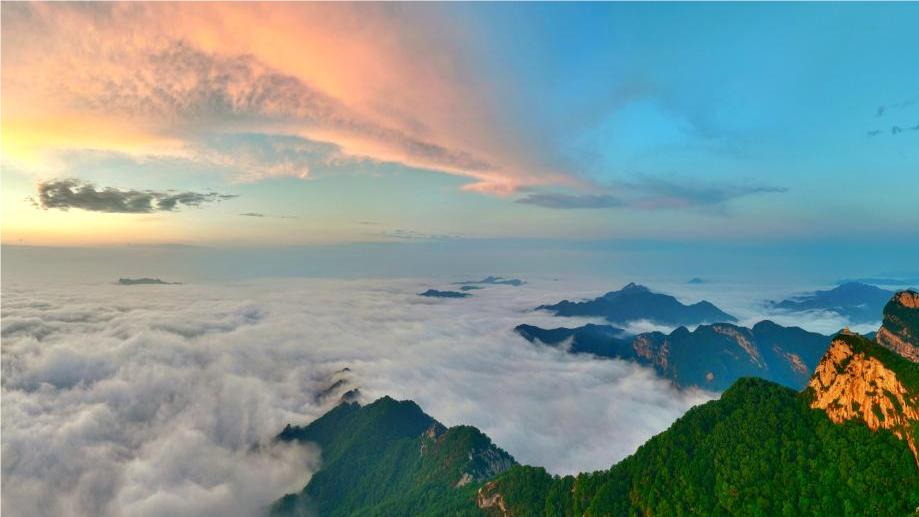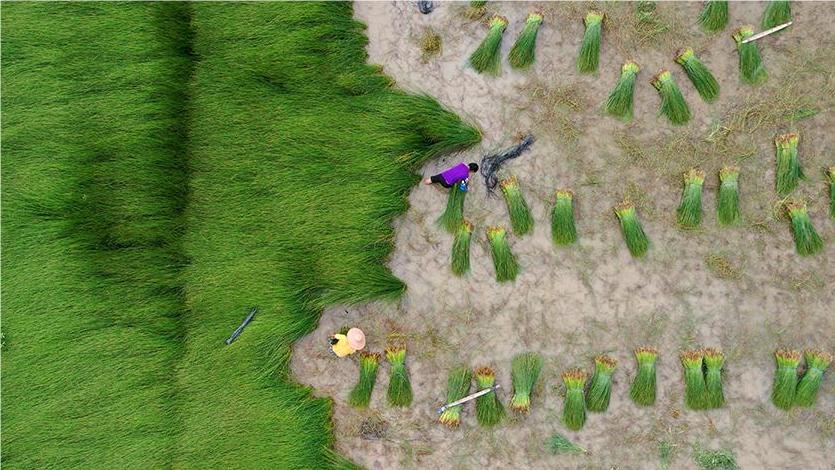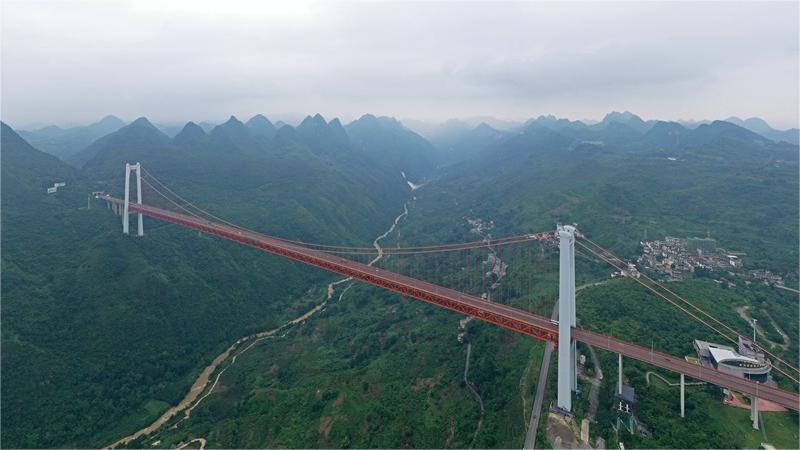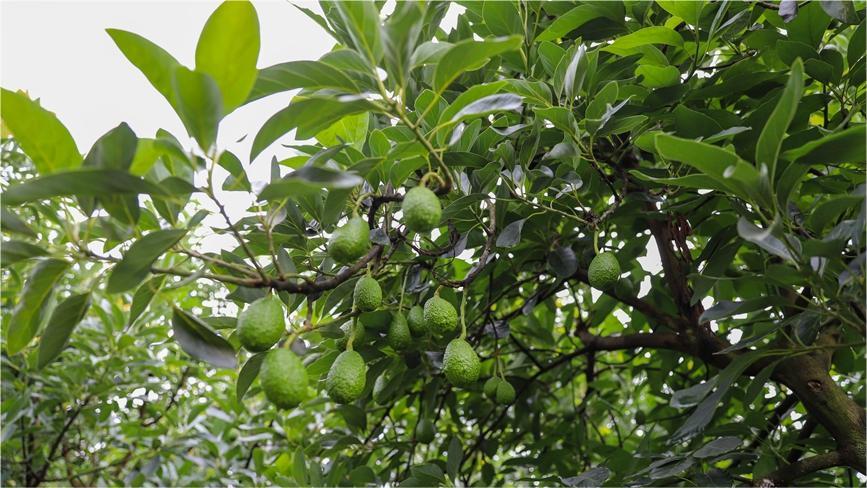Xi, Tokayev hold talks, hail China-Kazakhstan relations
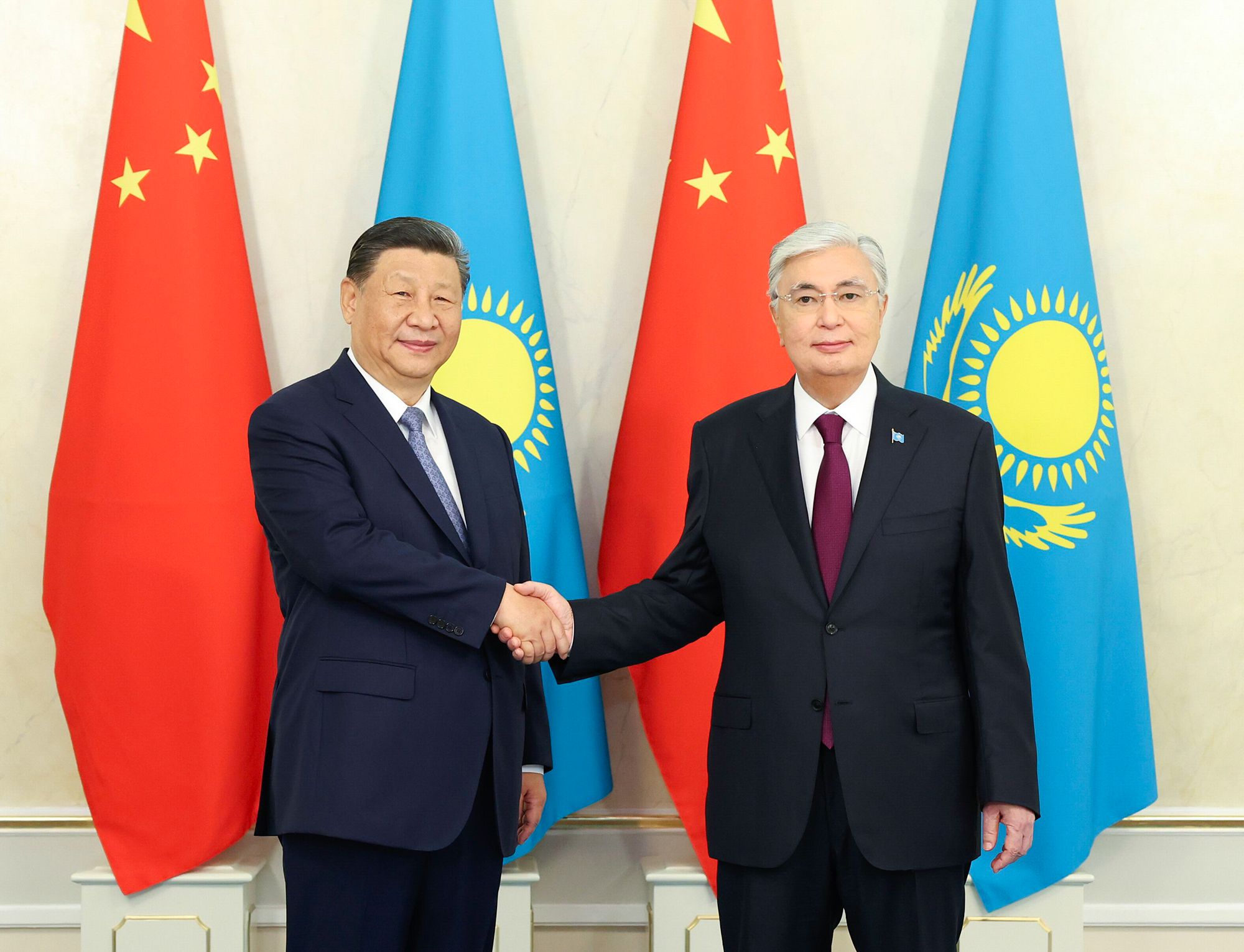
Chinese President Xi Jinping shakes hands with Kazakh President Kassym-Jomart Tokayev in Astana, Kazakhstan, on July 3, 2024. (Photo: Xinhua)
Chinese President Xi Jinping said that he is ready to work with Kazakh President Kassym-Jomart Tokayev to jointly build a more substantive and dynamic China-Kazakhstan community with a shared future, and inject more positive energy into the development and stability of the region and beyond, during his meeting with Tokayev at the presidential palace in Astana on Wednesday.
Xi is on a state visit to Kazakhstan and will attend here the 24th Meeting of the Council of Heads of State of the Shanghai Cooperation Organization (SCO).
President Xi's state visit to Kazakhstan will mark a new milestone in the development of bilateral relations, which are now soaring to a new height led by head-of-state diplomacy and built on frequent, cordial high-level bilateral exchanges, observers said.
Xi also met with leaders of other SCO members or dialogue partners, including Russian President Vladimir Putin, Uzbek President Shavkat Mirziyoyev, Kyrgyz President Sadyr Japarov, and Azerbaijani President Ilham Aliyev on Wednesday, during which they exchanged views on topics of mutual concerns and also on the development of the SCO.
Analysts said as the world is now grappling with rising geopolitical tensions, protectionism, and the Western decoupling attempts that threatened the strategic autonomy of developing countries, the face-to-face meetings between leaders of SCO member states also provide a rare opportunity to reach a consensus and coordinate a joint solution on pressing global and regional challenges, such as combating traditional and non-traditional security threats, as well as upholding multilateralism.
A new high in ties
Xi said during the meeting with Tokayev on Wednesday that China's will and determination to maintain and grow bilateral relations stand firm, and will not be changed due to any single incident or transformation in the international situation. China will always be a good neighbor and partner Kazakhstan can rely on and trust, he added.
Chinese side regards Kazakhstan as a priority in China's neighborhood diplomacy and an important partner for cooperation in Central Asia, said Xi.
Tokayev said Xi's state visit to Kazakhstan is of historic significance to the development of Kazakhstan-China relations, hailing China as a friendly neighbor, close friend, and important strategic partner of his country.
Following the talks, the two heads of state signed the joint statement between China and Kazakhstan, and witnessed the exchange of dozens of bilateral cooperation documents in the fields of economy and trade, connectivity, aviation, and aerospace, education, and media, according to Xinhua News Agency.
China and Kazakhstan support their aerospace institutions and enterprises in discussing the possibility of the commercial use of each other's space launch sites, said a joint statement between China and Kazakhstan released here on Wednesday.
The two sides also support their aerospace institutions and enterprises in communicating and cooperating in the peaceful use of outer space, and promote mutually beneficial cooperation in fields including the moon and deep space, as well as the reception and exchange of remote sensing data, said the joint statement signed by Xi and Tokayev.
The fruitful results underscore that full-fledged pragmatic cooperation is gaining momentum between the world's second-largest economy and the largest economy in Central Asia and a key node along the China-proposed Belt and Road Initiative (BRI).
Those fruitful results are also consequential for all the five Central Asia countries amid a turbulent international situation, Chinese and Kazakh scholars said, as they will "inject new vigor" into the region's development, and help those nations' modernization and globalization push, while also making significant contribution to the stability and security of the region.
"The visit clearly demonstrates that China attaches great importance to its relations with Kazakhstan, the high level and the unique nature of these bilateral ties, and Kazakhstan's vital position in China's foreign diplomacy," Cui Heng, a scholar from the Shanghai-based China National Institute for SCO International Exchange and Judicial Cooperation, told the Global Times on Wednesday.
Analysts said China and Kazakhstan have been interacting with each other under various mechanisms, from the highlight of head-of-state diplomacy that sets the top-level design to regular meetings between entrepreneurs and dialogues at the local levels, which constitute top-down "comprehensive, integrated exchanges."
Kazakhstan is hosting the SCO summit in Astana this week, and China will assume the rotating presidency of the SCO for 2024-2025. The Central Asia country next year will also host the China-Central Asia Summit - a key regional cooperation platform.
"The high level of relations between our countries indicates that China and Kazakhstan fully trust each other, develop mutually beneficial cooperation, and support the initiatives of both countries," Gulnar Shaimergenova, director of the China Studies Center in Kazakhstan, told the Global Times.
China's Beijing Language and Culture University (BLCU) will have a new branch in Astana, the capital of Kazakhstan. Tokayev studied Chinese language at BLCU from 1983 to 1984, and this new project has become a symbol of educational exchanges between the two countries, media reported.
BLCU is also where Kazakh President Tokayev studied Chinese from 1983 to 1984, and walking through the cultural exhibition hall of the campus on Wednesday, the Global Times reporter saw a photocopy of Tokayev's student ID card, which documented his youthful years in China and epitomizes the ever-lasting friendship between China and Kazakhstan.
The opening of the branch in Astana is expected to play an important role in promoting mutual understanding and exchanges between China and Kazakhstan, BLCU president Duan Peng told the Global Times on Wednesday.
"Kazakh youngsters could study here and make friends, and the school will become a bridge for mutual learning among different civilizations," Duan said, noting that the school plans to develop the Kazakh branch into a high-level university with undergraduate, master, and doctoral programs over the next five years, serving the entire Central Asian region.
Xi and Tokayev jointly attended an opening ceremony of the Trans-Caspian international transportation route (TITR) via video link on Wednesday.
Li Yongquan, director of the Eurasian Social Development Research at the Development Research Center of the State Council, told the Global Times on Wednesday that the infrastructure development "aligns perfectly" with China's development strategy and that of Kazakhstan and Central Asia.
"China and Kazakhstan's cooperation under BRI is highly pragmatic and has yielded substantial achievements, setting a global benchmark," Zhang Xiao, Chinese Ambassador to Kazakhstan, told the Global Times in an exclusive interview. He also voiced strong confidence that the two countries will jointly head toward the next golden decade of high-quality BRI cooperation.
According to analysts, as Central Asia is in dire need of more infrastructure construction, the implementation of TITR will further transform the landlocked region into a vital corridor between the East and West, facilitating its integration into the global supply chain. Meanwhile, China's capacity cooperation with resource-rich Central Asia also injects new impetus and certainty into regional development.
"Through frameworks such as the United Nations, the SCO, the Conference on Interaction and Confidence-Building Measures in Asia, and the China-Central Asia mechanism, both countries contribute to advancing a fairer and more equitable global governance system," Zhang stressed.
In 2013, Xi visited Kazakhstan and proposed the idea of building an "economic belt along the Silk Road," which, combined with the proposal of the 21st Century Maritime Silk Road, eventually became the BRI. He visited the Central Asian country in 2017 and 2022 to boost bilateral ties.
Face-to-face meetings
The face-to-face meetings between heads of state cover many critical discussions and decisions that will affect the future of all forms of cooperation in the Central Asia region and beyond, Maryam Agharabi, research coordinator at China &Central Asia Studies Center (CCASC) in Kazakhstan, told the Global Times.
They also provide a rare opportunity to focus not only on bilateral relations and consolidate mutual trust, but more importantly, to strengthen regional integration and jointly resolve emerging problems amid profound global changes, especially in fights against transnational security threats, Kazakh scholars said.
"Many countries will also be keen to learn China's experiences in security and development, and how the country provides new dynamics to the development of SCO at its 23 years of development," Cui said.
During the SCO summit chaired by Kazakhstan, the SCO Astana Declaration is expected to be adopted, according to a report by Astana Times.
Zhang said the SCO summit will see leaders of member states further promote the "Shanghai Spirit." The SCO member countries will engage in in-depth discussions on enhancing SCO development and cooperation in various fields, anchoring the organization's course toward building a community with a shared future, he noted.
The SCO's principles are gaining broader acceptance, with more countries aspiring to join the "SCO family," injecting stability and positive energy into regional security, stability, and development, he stressed.
Photos
Related Stories
- Xi says China always a trustworthy neighbor and partner for Kazakhstan
- Tokayev says Kazakhstan to firmly abides by one-China principle
- A glimpse of China-Kazakhstan (Lianyungang) Logistics Cooperation Base
- Energy cooperation 'cornerstone' of China, Kazakhstan economic relations, vivid example of complementary, win-win results
- Xi says China regards Kazakhstan priority in neighborhood diplomacy
- Beijing Language and Culture University establishes branch campus in Astana, Kazakhstan
Copyright © 2024 People's Daily Online. All Rights Reserved.






